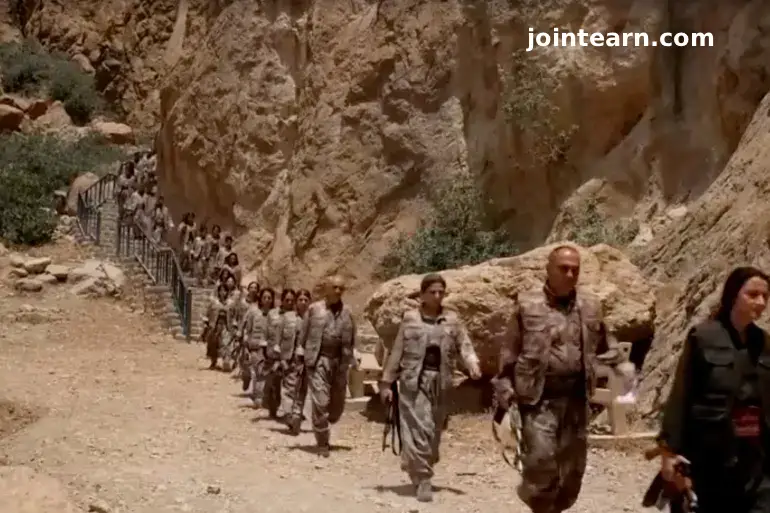
In a landmark step toward lasting peace, the Kurdistan Workers’ Party (PKK) announced on Sunday that it has withdrawn all remaining fighters from Turkiye to northern Iraq, marking the official end of its 40-year armed struggle against the Turkish state.
The withdrawal, which took place in the Qandil region of northern Iraq, was announced during a formal ceremony attended by journalists and party officials. According to an AFP correspondent present at the event, the PKK confirmed that its fighters have left Turkish territory as part of the ongoing peace process known as the “Terrorism-Free Turkiye” initiative.
End of a Four-Decade Armed Struggle
The PKK, which formally renounced its armed rebellion in May 2025, has been undergoing a gradual transition from an insurgent movement to a democratic political organization. The group’s leadership declared that the latest move is a continuation of efforts to achieve political integration and peace after decades of conflict that have claimed approximately 50,000 lives.
“We are implementing the withdrawal of all our forces within Turkiye,” the PKK statement said. “The process of disarmament and democratic transition is irreversible.”
A photograph released by the group showed 25 fighters, including eight women, arriving in the Qandil Mountains after crossing the Turkish border. The image symbolized the completion of a process that began with a symbolic disarmament ceremony in July, where the PKK destroyed a batch of weapons to mark its shift away from armed confrontation.
Turkish Government Welcomes “Strategic and Historic Step”
The Turkish government, led by President Recep Tayyip Erdogan, welcomed the announcement as part of its “Terrorism-Free Turkiye” framework, an initiative aimed at reconciling with Kurdish groups through dialogue and political reform.
AKP spokesperson Ömer Çelik called the PKK’s withdrawal a “strategic and historic step” that opens a path for national unity and long-term stability.
“This is a new chapter for Turkiye,” Çelik said on social media platform X (formerly Twitter). “We believe the end of armed conflict marks the beginning of a more democratic and inclusive future.”
The PKK’s Call for Legal and Political Reform
Despite its disarmament, the PKK urged Ankara to take additional legal and political measures to ensure the sustainability of the peace process. In its statement, the group emphasized the need for new legislation that guarantees freedom, equality, and democratic participation for the Kurdish minority.
“The legal and political steps required by the process—and the laws of freedom and democratic integration necessary to participate in democratic politics—must be put in place without delay,” the PKK said.
The statement echoes earlier appeals from Abdullah Ocalan, the imprisoned PKK leader, who has called for a peaceful democratic struggle to secure Kurdish cultural and political rights within Turkiye.
A Symbolic Moment in July Paved the Way
In July 2025, the PKK organized a symbolic ceremony in Sulaimaniyah, northern Iraq, where it publicly destroyed a cache of weapons in front of media representatives. The move was celebrated by the Turkish government as “an irreversible turning point.”
“Today is a new day; a new page has opened in history,” President Erdogan said during a televised address following the ceremony. “The doors of a great, powerful, and peaceful Turkiye have been flung wide open.”
The ceremony also served as a public declaration of the PKK’s intent to fully withdraw its remaining military elements from Turkish territory and end hostilities once and for all.
Regional Impact: Implications for Syria and Beyond
The end of Turkiye’s conflict with the PKK is expected to have wider geopolitical consequences across the Middle East, particularly in Syria and Iraq.
Ankara has long accused the Syrian Democratic Forces (SDF)—a US-backed coalition in Syria—of being an offshoot of the PKK. Analysts suggest that a formal end to the PKK’s insurgency could ease tensions between Turkiye, the United States, and Kurdish groups in Syria, potentially reshaping regional security dynamics.
Furthermore, the transition may encourage greater cooperation between Baghdad, Erbil, and Ankara on security and counterterrorism issues in northern Iraq, where PKK bases are located.
“The PKK’s withdrawal opens a new diplomatic corridor for dialogue among regional players,” said political analyst Dr. Selim Yildirim. “It could reduce cross-border tensions and strengthen the prospects for Kurdish autonomy through peaceful political means.”
A Fragile but Hopeful Peace
While the withdrawal marks a major milestone, both Turkish officials and Kurdish representatives acknowledge that the peace process remains fragile. Deep mistrust, decades of violence, and political polarization could still threaten the progress made so far.
Still, optimism prevails among many observers who see the PKK’s disarmament as a historic opportunity to address longstanding Kurdish grievances through inclusive politics, economic development, and cultural recognition.
If successfully implemented, the peace process could not only stabilize southeastern Turkiye but also boost regional security and strengthen Turkiye’s standing in international diplomacy.
Conclusion: A New Chapter for Turkiye and the Kurds
The withdrawal of PKK fighters from Turkiye to Iraq represents more than just the end of a war — it symbolizes the beginning of a new political era for both sides. As the group transitions from armed rebellion to democratic participation, and as Ankara pledges reforms to ensure inclusion, many hope this moment will mark the final end of one of the Middle East’s longest-running conflicts.


Leave a Reply